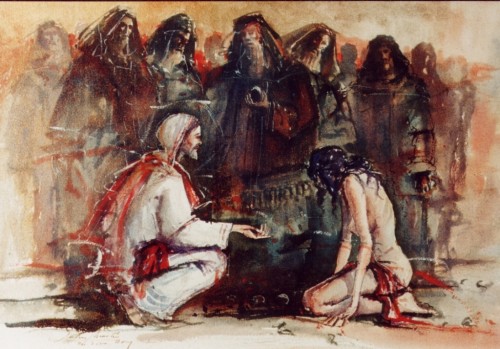 Forgiveness seems in short supply in our age of libel, lawsuits, and violence. Revenge is valued over restraint. Forgiveness is set aside to pursue personal rights.
Forgiveness seems in short supply in our age of libel, lawsuits, and violence. Revenge is valued over restraint. Forgiveness is set aside to pursue personal rights.
What happened to our Christian nation? It never was a Christian nation. Our nation was founded on the principles and pursuit of religious, political, and economic freedom. Of course, now many pursue freedom from religion, but that's another topic altogether.
Even within Christianity, forgiveness can become a forgotten facet of our faith. And yet, it's foundational to our faith.
Sent as Jesus was sent
Forgiveness is an integral part of the Great Commission. It may get overlooked carrying out the command to go preach and make disciples, but it's an important part of the message. It's found in two of the four gospels (Luke 24:45-48; John 20:21-23).
It's the bedrock of the Lord's ministry of reconciliation between God and humanity. Forgiveness for sin was given under the Old Covenant (Mosaic) Law, but it was temporary.
Jesus, by dying on the cross and atoning for sin once for all (Heb 7:27), made forgiveness the entry point to eternal life (Heb 9:12).
[bctt tweet="Forgiveness is an important element of the Great Commission"]
How many times must we forgive?
In a culture of individual rights and freedoms, we want to receive forgiveness more than extend it. But it's not just our present culture, it's a human issue. It was the apostle Peter who asked, “Lord, how many times shall I forgive my brother or sister who sins against me? Up to seven times?” (Matt 18:21)
This followed the Lord's teaching on several things including resolving conflicts. Jesus' answer was a parable about an unforgiving servant, who was forgiven a great debt. The parable's simple truth is that we are to show mercy toward other debtors.
[bctt tweet="We want to receive forgiveness more than extend it"]
Jesus also warns that if we don't forgive others in the same manner as we've received forgiveness, the consequence is great—
But if you do not forgive others their sins, your Father will not forgive your sins. (Matt 6:15)
But what about justice?
An inevitable objection to forgiveness is the appeal for justice. After all, we live in a nation ruled by law. If you break the law, there is a penalty—a judgment. Wouldn't this be true in God's kingdom? Here are two things to consider.
First, no one is in a position to judge wrongs more than God. He alone will bring judgment as it's needed. And He alone can, has, and will set things right. It is a dangerous place for us to sit in His seat of judgment, especially when we deserve it ourselves (Heb 10:31).
[bctt tweet="It is a dangerous place for us to sit in God's seat of judgment"]
Contrary to the opinion of some, God is not an angry God yearning to bring judgment on sinners, He is full of mercy. This is His nature (Psa 103:8; Luke 6:36), and mercy is greater than judgment. Jesus' half-brother said it well—
For judgment is without mercy to one who has shown no mercy. Mercy triumphs over judgment. (James 2:13)
Judgment or mercy?
This is seen in the story of the adulterous woman brought to Jesus by some scribes and Pharisees (John 8:2-11). The Law required her to be stoned. What would Jesus do? He invited whoever was without sin to cast the first stone.
We don't know what He wrote in the sand, but every man left without objection. When the woman was left standing with Jesus, He didn't condemn her but showed mercy.
Forgiveness and how to find it
When we are wronged by someone, it is difficult to forgive. The deeper our heart is wounded, the harder it is to forgive. And yet, as followers of Jesus, we are commanded to forgive one another.
But how do we forgive when the person is clearly wrong and unwilling to own up to it? How do we forgive when we don't feel forgiveness?
[bctt tweet="How do we forgive when we don't feel forgiveness?"]
When my son was five years old, he told us he didn't feel love. We are an affectionate and close family, so this stunned us. Thankfully, the Lord gave us some wisdom.
After a bit, we encouraged him to show love, then he would feel it. He's done that ever since, which is reflected in his life and family.
Just like Jesus
The final words of Jesus on the cross are referred to as the seven last sayings of Christ. Offering Himself up as the Lamb of God to take away the sin of the world (John 1:29), Jesus forgives the ones who crucify Him.
“Father, forgive them, for they know not what they do.” (Luke 23:34)
Jesus didn't just tell us to forgive, He showed us how to do it.
A position of strength
One thing that's helped me over the years is realizing that forgiveness is an act of mercy. It is a suspension of judgment, a forgiveness of a debt of wrong "owed" to me.
It is also a position of strength. In a courtroom, only the judge can extend mercy. When I forgive, or extend mercy, I have the position of strength. Forgiveness also brings freedom. It frees me from pursuing justice or carrying the resentment of the "debt" owed.
[bctt tweet="Forgiveness is an act of mercy and strength"]
We can only follow Jesus with a genuine faith when we carry and live out the same message as He did.
Questions to consider and ask ourselves
What holds us back from forgiving others?
Who do we need to forgive, in the same way Jesus forgave us?


